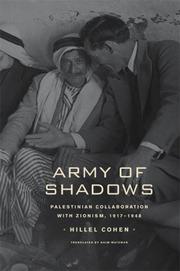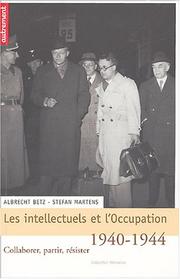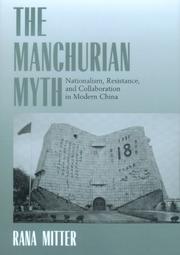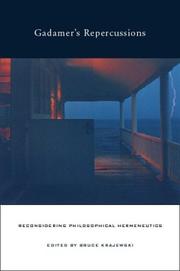| Listing 1 - 10 of 16 | << page >> |
Sort by
|
Book
ISBN: 0299317234 9780299317232 9780299317201 029931720X Year: 2018 Publisher: Madison, Wisconsin
Abstract | Keywords | Export | Availability | Bookmark
 Loading...
Loading...Choose an application
- Reference Manager
- EndNote
- RefWorks (Direct export to RefWorks)
Since the fall of General Augusto Pinochet's dictatorship (1973-1990), Chilean society has shied away from the taboo subject of civilian complicity, preferring to pursue convictions of military perpetrators. But the torture, murders, deportations, and disappearances of tens of thousands of people in Chile were not carried out by the military alone; it required a vast civilian network of support. Some actively participated in the regime's massive violations of human rights for personal gain or from a sense of patriotic duty. Others supported Pinochet's neoliberal economic program while ignoring the crimes of that era. Michael J. Lazzara boldly argues that today's Chile is a product of both complicity and complacency. Combining historical analysis with deft literary, political, and cultural critique, he scrutinizes the post-Pinochet rationalizations made by politicians, artists, intellectuals, bystanders, former revolutionaries-turned-neoliberals, and common citizens. He looks beyond victims and perpetrators to unveil the ambiguous, ethically vexed realms of memory and experience that authoritarian regimes inevitably generate.
Collective memory --- Collaborationists --- Human rights --- Dictatorship --- Absolutism --- Autocracy --- Tyranny --- Authoritarianism --- Despotism --- Totalitarianism --- Collaborators (Traitors) --- Traitors --- Collective remembrance --- Common memory --- Cultural memory --- Emblematic memory --- Historical memory --- National memory --- Public memory --- Social memory --- Memory --- Social psychology --- Group identity --- National characteristics --- History --- Chile
Book
ISBN: 0824887700 0824883322 Year: 2021 Publisher: Honolulu : University of Hawaii Press,
Abstract | Keywords | Export | Availability | Bookmark
 Loading...
Loading...Choose an application
- Reference Manager
- EndNote
- RefWorks (Direct export to RefWorks)
Iconographies of Occupation is the first book to address how the "collaborationist" Reorganized National Government (RNG) in Japanese-occupied China sought to visualize its leader, Wang Jingwei (1883-1944); the Chinese people; and China itself. It explores the ways in which this administration sought to present itself to the people over which it ruled at different points between 1939, when the RNG was first being formulated, and August 1945, when it folded itself out of existence. What sorts of visual tropes were used in regime iconography and how were these used? What can the intertextual movement of visual tropes and motifs tell us about RNG artists and intellectuals and their understanding of the occupation and the war?Drawing on rarely before used archival records relating to propaganda and a range of visual media produced in occupied China by the RNG, the book examines the means used by this "client regime" to carve out a separate visual space for itself by reviving prewar Chinese methods of iconography and by adopting techniques, symbols, and visual tropes from the occupying Japanese and their allies. Ultimately, however, the "occupied gaze" that was developed by Wang's administration was undermined by its ultimate reliance on Japanese acquiescence for survival. In the continually shifting and fragmented iconographies that the RNG developed over the course of its short existence, we find an administration that was never completely in control of its own fate-or its message. Iconographies of Occupation presents a thoroughly original visual history approach to the study of a much-maligned regime and opens up new ways of understanding its place in wartime China. It also brings China under the RNG into dialogue with broader theoretical debates about the significance of "the visual" in the cultural politics of foreign occupation.
Art and state --- Collaborationists --- Political culture --- HISTORY / Asia / China. --- History --- Culture --- Political science --- Collaborators (Traitors) --- Traitors --- Art --- Arts --- Politics and art --- State and art --- Art and society --- Cultural policy --- Education and state --- Government policy

ISBN: 128276229X 9786612762291 0520933982 1435630408 9780520933989 9781435630406 1433711222 9781433711220 9780520252219 0520252217 6612762292 9781282762299 Year: 2008 Publisher: Berkeley, Calif. University of California Press
Abstract | Keywords | Export | Availability | Bookmark
 Loading...
Loading...Choose an application
- Reference Manager
- EndNote
- RefWorks (Direct export to RefWorks)
Inspired by stories he heard in the West Bank as a child, Hillel Cohen uncovers a hidden history in this extraordinary and beautifully written book-a history central to the narrative of the Israel-Palestine conflict but for the most part willfully ignored until now. In Army of Shadows, initially published in Israel to high acclaim and intense controversy, he tells the story of Arabs who, from the very beginning of the Arab-Israeli encounter, sided with the Zionists and aided them politically, economically, and in security matters. Based on newly declassified documents and research in Zionist, Arab, and British sources, Army of Shadows follows Bedouins who hosted Jewish neighbors, weapons dealers, pro-Zionist propagandists, and informers and local leaders who cooperated with the Zionists, and others to reveal an alternate history of the mandate period with repercussions extending to this day. The book illuminates the Palestinian nationalist movement, which branded these "collaborators" as traitors and persecuted them; the Zionist movement, which used them to undermine Palestinian society from within and betrayed them; and the collaborators themselves, who held an alternate view of Palestinian nationalism. Army of Shadows offers a crucial new view of history from below and raises profound questions about the roots of the Israel-Palestine conflict.
Jews --- Zionism --- Palestinian Arabs --- Collaborationists. --- Jewish-Arab relations --- Collaborators (Traitors) --- Traitors --- Politics and government --- History --- History of Asia --- anno 1910-1919 --- anno 1920-1929 --- anno 1930-1939 --- anno 1940-1949 --- Israel --- Palestine --- academic. --- arab israeli. --- arab. --- bedouin. --- childhood. --- collaborators. --- controversial. --- economics. --- economy. --- growing up. --- history. --- israel palestine conflict. --- israel. --- jewish. --- judaism. --- nationalism. --- nationalist. --- palestine. --- palestinian. --- political. --- politics. --- propaganda. --- scholarly. --- security. --- untold history. --- untold story. --- west bank. --- zionist. --- zionists.

ISBN: 3776619082 9783776619089 Year: 1996 Publisher: München Herbig
Abstract | Keywords | Export | Availability | Bookmark
 Loading...
Loading...Choose an application
- Reference Manager
- EndNote
- RefWorks (Direct export to RefWorks)
Collaborationists --- World War, 1939-1945 --- European War, 1939-1945 --- Second World War, 1939-1945 --- World War 2, 1939-1945 --- World War II, 1939-1945 --- World War Two, 1939-1945 --- WW II (World War, 1939-1945) --- WWII (World War, 1939-1945) --- History, Modern --- Collaborators (Traitors) --- Traitors --- History&delete& --- Encyclopedias --- Collaborationists&delete& --- Occupied territories&delete& --- History of Europe --- anno 1940-1949 --- History --- Occupied territories
Book
ISBN: 9782707322777 Year: 2013 Volume: *16 Publisher: Paris Minuit
Abstract | Keywords | Export | Availability | Bookmark
 Loading...
Loading...Choose an application
- Reference Manager
- EndNote
- RefWorks (Direct export to RefWorks)
Afin de savoir comment il se serait comporté et d'examiner les choix qu'il aurait faits, l'auteur construit en détail l'existence qui aurait été la sienne s'il avait vécu pendant la Seconde Guerre mondiale, en référence au parcours de Franz Kafka, Daniel Cordier, Romain Gary, Sophie Scholl ou encore Sousa Mendes.
French literature --- Psychohistory --- World War, 1939-1945 --- Psychohistoire --- Littérature française --- 2ème guerre mondiale --- Themes, motives --- Literature and the war --- Thèmes, motifs --- Littérature et guerre --- Littérature française --- 2ème guerre mondiale --- Thèmes, motifs --- Littérature et guerre --- Themes, motives. --- Collaborationists --- Commitment (Psychology) --- Engagement (Philosophy) --- Involvement (Philosophy) --- Participation --- Philosophy --- Choice (Psychology) --- Acceptance and commitment therapy --- Collaborators (Traitors) --- Traitors --- Fifth column --- Quislings --- Psychological aspects --- Underground movements --- Psychology --- Guerrillas --- Resistance movements --- Occupied territories

ISBN: 2746705400 9782746705401 Year: 2004 Volume: 106 Publisher: Paris Autrement
Abstract | Keywords | Export | Availability | Bookmark
 Loading...
Loading...Choose an application
- Reference Manager
- EndNote
- RefWorks (Direct export to RefWorks)
1940. Le traumatisme de la défaite devient, chez beaucoup d'intellectuels français, l'expérience d'une perte : celle de l'influence de leur nation dans le monde, mais aussi de leur statut individuel en tant qu'écrivains. Dans une société où l'économie et la technique sont amenées désormais à jouer un rôle déterminant, ils cherchent une nouvelle identité. Confrontés à des modèles contradictoires, à côté de ceux, très rares, qui entrent en résistance, certains choisissent l'exil ou la passivité, d'autres optent pour le fascisme comme moyen de combattre le communisme et de « réduire la décadence » (Drieu La Rochelle). 1944. L'histoire opère un brusque retournement. La plupart des intellectuels ayant adhéré, à des degrés divers, à la collaboration se sentent trahis par la politique allemande, qui n'a pas pu remplir ses promesses d'une « nouvelle Europe » et a même échoué à dresser un rempart contre le bolchevisme. Pendant ces quatre années, pourtant, la production culturelle fut, en France, impressionnante. Comment expliquer un tel paradoxe ? Les contradictions extrêmes de cette crise aiguë méritent d'être réexaminées de près. La distance historique permet à une équipe d'historiens de cinq pays d'Europe de porter un nouveau regard sur cette période cruciale de l'histoire européenne.
Intellectuals --- World War, 1939-1945 --- War and literature --- Intellectuels --- 2ème guerre mondiale --- Guerre et littérature --- History --- Underground movements --- Collaborationists --- Histoire --- Mouvements de résistance --- Collaborateurs --- France --- Intellectual life --- Vie intellectuelle --- France (History) --- 2ème guerre mondiale --- Guerre et littérature --- Mouvements de résistance --- Intelligentsia --- Persons --- Social classes --- Specialists --- Collaborators (Traitors) --- Traitors --- Intellectuals - France - History - 20th century --- World War, 1939-1945 - Underground movements - France --- Collaborationists - France - History - 20th century --- France - History - German occupation, 1940-1945 --- France - Intellectual life - 20th century

ISBN: 052092388X 1597347329 9780520923881 9780585391243 0585391246 9781597347327 9780520221116 0520221117 Year: 2000 Publisher: Berkeley
Abstract | Keywords | Export | Availability | Bookmark
 Loading...
Loading...Choose an application
- Reference Manager
- EndNote
- RefWorks (Direct export to RefWorks)
A powerful element in twentieth-century Chinese politics has been the myth of Chinese resistance to Japan's seizure of Manchuria in 1931. Investigating the shifting alliances of key players in that event, Rana Mitter traces the development of the narrative of resistance to the occupation and shows how it became part of China's political consciousness, enduring even today. After Japan's September 1931 military strike leading to a takeover of the Northeast, the Chinese responded in three major ways: collaboration, resistance in exile, and resistance on the ground. What motives prompted some Chinese to collaborate, others to resist? What were conditions like under the Japanese? Through careful reading of Chinese and Japanese sources, particularly local government records, newspapers, and journals published both inside and outside occupied Manchuria, Mitter sheds important new light on these questions.
Nationalism --- Consciousness, National --- Identity, National --- National consciousness --- National identity --- International relations --- Patriotism --- Political science --- Autonomy and independence movements --- Internationalism --- Political messianism --- Manchuria (China) --- History --- 1930s. --- china. --- chinese history. --- chinese nationalism. --- collaborators. --- colonialism. --- exile. --- government. --- history. --- imperialism. --- japan. --- japanese occupation. --- kwantung army. --- league of nations. --- ma zhanshan. --- manchukuo. --- manchuria. --- may thirtieth incident. --- military. --- nanjing. --- nation. --- nationalism. --- nonfiction. --- occupied zone. --- political history. --- politics. --- postwar. --- puppet government. --- rebellion. --- resistance fighters. --- resistance. --- salvation society. --- tanggu truce. --- versailles conference. --- violence. --- war. --- zhang xueliang.
Book
ISBN: 9059900030 Year: 2003 Volume: *1 Publisher: Antwerpen Meulenhoff/Manteau
Abstract | Keywords | Export | Availability | Bookmark
 Loading...
Loading...Choose an application
- Reference Manager
- EndNote
- RefWorks (Direct export to RefWorks)
Dutch literature --- Collaboratie --- Collaboration (guerre) --- Guerre mondiale II ; Belgique --- Wereldoorlog II ; België --- België --- Vlaanderen --- #SBIB:949.3H3 --- #SBIB:041.GIFT --- 343.32 <493> --- 949.3.036 --- #A0308A --- 946 Tweede wereldoorlog --- Politieke geschiedenis van België --- Incivisme. Spionage. Collaboratie--België --- Collaborationists --- World War, 1939-1945 --- 343.32 <493> Incivisme. Spionage. Collaboratie--België --- België. --- Vlaanderen. --- Collaborators (Traitors) --- Traitors --- Belgium --- History --- Socioculturele geschiedenis na 1830 --- Boekgeschiedenis --- Literatuur, muziek en beeldende kunst/grafiek --- BOON (LOUIS PAUL), 1912-1979 --- BELGIQUE --- GUERRE MONDIALE (2E, 1939-1945) DANS LA LITTERATURE --- HISTOIRE --- 1940-1945 (OCCUPATION ALLEMANDE) --- COLLABORATION --- FLANDRE
Book
ISBN: 9053560920 9789053560921 Year: 1994 Publisher: Amsterdam Amsterdam university press
Abstract | Keywords | Export | Availability | Bookmark
 Loading...
Loading...Choose an application
- Reference Manager
- EndNote
- RefWorks (Direct export to RefWorks)
Fiction --- Thematology --- Dutch literature --- anno 1900-1999 --- Collaborateurs dans la littérature --- Collaborateurs in de literatuur --- Collaborationists in literature --- Collaborationists --- -Dutch fiction --- -Politics and literature --- Politics in literature --- History --- -History and criticism --- 839.3 "19" --- -Politics in literature --- Political science in literature --- Literature --- Literature and politics --- Collaborators (Traitors) --- Traitors --- Nederlandse literatuur--20e eeuw. Periode 1900-1999 --- Political aspects --- Dutch fiction --- Politics and literature --- Politics in literature. --- History and criticism. --- 839.3 "19" Nederlandse literatuur--20e eeuw. Periode 1900-1999 --- History and criticism --- Collaborationists - - History - - 20th century - Netherlands --- -Dutch fiction - - History and criticism - 20th century --- -Politics and literature - Netherlands

ISBN: 0520927958 1597346268 0520231864 9780520927957 1417522623 9781417522620 9781597346269 9780520231863 Year: 2004 Publisher: Berkeley, Calif. University of California Press
Abstract | Keywords | Export | Availability | Bookmark
 Loading...
Loading...Choose an application
- Reference Manager
- EndNote
- RefWorks (Direct export to RefWorks)
Certainly one of the key German philosophers of the twentieth century, Hans-Georg Gadamer also influenced the study of literature, art, music, sacred and legal texts, and medicine. Indeed, while much attention has been focused on Gadamer's writings about ancient Greek and modern German philosophy, the relevance of his work for other disciplines is only now beginning to be properly considered and understood. In an effort to address this slant, this volume brings together many prominent scholars to assess, re-evaluate, and question Hans-Georg Gadamer's works, as well as his place in intellectual history. The book includes a recent essay by Gadamer on "the task of hermeneutics," as well as essays by distinguished contributors including Jürgen Habermas, Richard Rorty, Gerald Bruns, Georgia Warnke, and many others. The contributors situate Gadamer's views in surprising ways and show that his writings speak to a range of contemporary debates-from constitutional questions to issues of modern art. A controversial final section attempts to uncover and clarify Gadamer's history in relation to National Socialism. More an investigation and questioning than a celebration of this venerable and profoundly influential philosopher, this collection will become a catalyst for any future rethinking of philosophical hermeneutics, as well as a significant starting place for rereading and reviewing Hans-Georg Gadamer.
Gadamer, Hans Georg,-- 1900-. --- Philosophy & Religion --- Philosophy --- Gadamer, Hans-Georg, --- Gadamera, H. G., --- Gadamer, H.-G. --- Kao-ta-mei, --- Gaodamei, --- Ka-ta-mo-erh, --- Gadamoer, --- غادامير، هانز جورج، --- Gkantamer, Chans-Gkeornk, --- PHILOSOPHY / Political. --- aesthetics. --- allusion. --- art. --- being. --- collaborators. --- derrida. --- episteme. --- epistemology. --- ethics. --- fascism. --- gadamer. --- german philosophy. --- habermas. --- hegel. --- heidegger. --- hermeneutics. --- historicism. --- language. --- law. --- levinas. --- literature. --- metaphysics. --- moral philosophy. --- morality. --- national socialism. --- nazi. --- nietzsche. --- nonfiction. --- nothingness. --- orozco. --- philosophy. --- political philosophy. --- political science. --- postmodernism. --- romanticism. --- rorty. --- social sciences. --- socialism. --- strauss. --- third reich. --- truth and method. --- waite. --- warnke. --- zuckert.
| Listing 1 - 10 of 16 | << page >> |
Sort by
|

 Search
Search Feedback
Feedback About UniCat
About UniCat  Help
Help News
News